The preparations had been made. Face paint applied. Stilts
mounted. Marching band in place. In just moments I would be leading the march
for peace across downtown Guatemala City, the nation’s capital.
Only I didn’t know it yet.
This is a true story.
On Friday morning, I took my place at
the very
front
of a very long line of festively dressed purveyors of peace and began to march,
smile, and wave like a reluctant beauty queen down the streets of Guatemala
City.
Friday commemorated International Day of Peace worldwide,
and my friends at
AVP were participating in a rambunctious parade of peace.
I was just along for the ride.
That is, until the grand marshal, who was wearing a clown
suit, discovered I was holding the biggest, most informative banner of all of
the parade participants and pushed me to the front of the line to serve as the
vanguard in the victory against violence march with my friend Luis.
At. The front. Of. The. ENTIRE. Parade.
Was I amused? Most definitely. But was this what I was
expecting or wanting? Not at all.
You see, I love the work of AVP. I love the idea of peace
building. But it’s not really my thing. Not really my passion.
I was there in the front of the line, heralding the peace,
but my heart wasn’t in it. I was just a warm body. A filler.
It wasn’t my parade.
A few rows behind me, there was a young girl dressed as a
jester shaking her hips to the hypnotic rhythm of the marching band. Every time
I glanced back, she was engaging the crowd, shimmying this way and that, and
laughing like crazy. Joy spilled out of her.
This was her parade.
And the parade of thousands of school age kids who met us in
the park by forming a human chain, marching, clanging and combating violence
with passion and creativity, communication and collaboration, dignity and
dancing. (Bonus: check out this awesome video of the marching band and dancers!)
Don’t get me wrong; I love peace building and creativity and
especially dancing, but that day’s parade, that day’s demonstration, was not my
passion.
And that’s okay.
I remember when people used to call me the “recycle girl.” I
would get so frustrated when people would boil down my passion to create
change, to work for a better, more just world, into the tiny box of a word
called a “hobby.” Like some people
like biking, running on the beach, or building model airplanes; I just happened
to like social justice.
No, social justice, creation care, and empowering the poor
are not my hobbies or Facebook interests. They are part of a calling that hasn’t changed with
leaving my job at Plant With Purpose. The location has changed. The exact
method has changed, but my heart hasn’t.
I still want to be an agent of love and transformation. I
still want to be someone who fosters dignity for the defenseless. Who shines
light on our true identities as children of Christ. Who empowers people to use
their gifts and talents to create a more just, more joyous world.
Right now, I just don’t know exactly how to do this. Where
to spend my time. What projects to join. Right now, it doesn’t feel like I’m
doing a good job at my calling.
It feels a lot like I’m carrying someone else’s sign in
someone else’s parade. A worthwhile parade; just not mine.
I’m learning to smile. To find joy in their parade. In their
marching and stilts and merengue music. In the peace that’s being fostered. In
the light that shines.
I’m learning my “hobbies” and interests don’t define me. My
job doesn’t define me. Even my values don’t define me. Only LOVE defines me. I
am the riches. I am the treasure. I am the pearl of great price.
I remember this as I pray for patience and discernment as I wait for my own parade, my own next step in what God has called me to do. In the meantime, I pray for the humility to help others put on a good parade. For the
faith and hope to not give up on my own calling that has brought
me to Guatemala. On a scene that I
can’t yet see clearly, that lingers dark and formless before me.
I pray, I wait, and I grab the corner of the banner, smile, wave,
and continue on.







.JPG)







.JPG)




